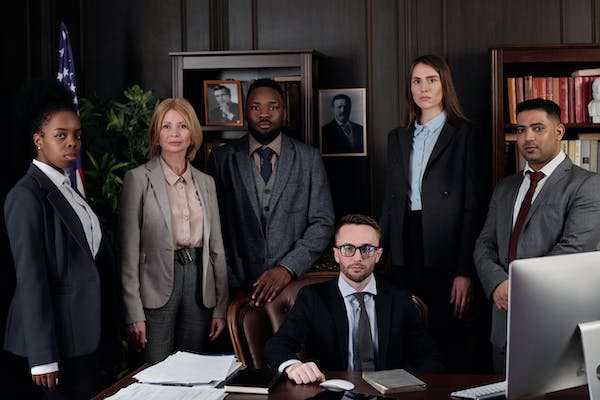As a layperson, it’s easy to be captivated by the drama and intrigue of criminal trials that we see on TV or read about in the news. We often find ourselves wondering about the arguments presented and the strategies employed by criminal lawyers to defend their clients. However, there is a side to being a criminal lawyer that is not often talked about, a side that only those who have experienced it truly understand. In this article, we will delve into the hidden realities of being a criminal lawyer, offering insights from seasoned professionals who have dedicated their lives to this demanding and often misunderstood profession.

Section 1: The Role of a Criminal Defense Attorney
Being accused of a crime is a serious matter that can have life-altering consequences. This is where a criminal defense attorney comes in. Their role is to provide legal representation to individuals facing criminal charges and ensure that their clients receive a fair trial. While it may seem tempting to represent oneself in a criminal trial, the complexities of the legal system make it extremely difficult for a layperson to effectively navigate the intricacies of the law. Criminal defense lawyers are trained to uncover unique elements and arguments that can potentially reduce the severity of a conviction or even secure an acquittal. They possess a deep understanding of criminal law and court procedures, allowing them to organize and present facts in a manner that supports a winning legal theory.
“Prison time, large fines, and felony convictions are serious penalties. If you are facing any of these due to a significant crime, you will want a great criminal defense lawyer fighting for you.” – Abraham Lincoln
Subsection 1.1: Knowledge of the Criminal Law System
One of the most critical aspects of being a criminal defense attorney is having a comprehensive understanding of the criminal law system. Criminal lawyers have pursued a Juris Doctorate degree, which equips them with the knowledge and expertise necessary to navigate the intricacies of the legal system. They are well-versed in local court rules and regulations, as well as the “unwritten rules” that exist within each jurisdiction. This familiarity with the legal landscape allows criminal defense attorneys to identify potential loopholes, inconsistencies, or procedural errors that may work in favor of their clients. Additionally, they have established relationships with key players in the legal system, such as prosecutors and judges, which can be advantageous in building a strong case and negotiating plea bargains.
“Criminal defense attorneys possess a Juris Doctorate degree, equipping them with a comprehensive understanding of the criminal justice system and the ability to defend their clients effectively.”
Subsection 1.2: Impeccable Negotiation Skills
Negotiation is a crucial skill for a criminal defense attorney. While going to trial may be the desired outcome for some clients, in many cases, a plea bargain to reduce a sentence or eliminate charges may be the most favorable option. Prosecutors often take advantage of defendants who choose to represent themselves, knowing that they are not as skilled in negotiation tactics. On the other hand, seasoned criminal defense attorneys have honed their negotiation skills through years of experience. They are adept at finding creative solutions and alternative sentencing options that laypersons may not even be aware of. By advising their clients on the best steps to take throughout the case, criminal defense attorneys can position them for successful plea negotiations, ultimately achieving more favorable outcomes.
“A plea bargain to reduce a sentence or eliminate charges may be your best option, but prosecutors sometimes take advantage of defendants that represent themselves. The prosecutor knows that going to trial against a ‘novice’ will be much easier than a trial with an expert criminal defense attorney“
Subsection 1.3: Psychological Support
While criminal defense attorneys may not have formal training in psychology, their role often extends beyond legal representation. Defendants in criminal cases often experience a roller coaster of emotions, including embarrassment, depression, and low self-esteem. It is during these challenging times that the emotional support provided by a criminal defense attorney becomes invaluable. By remaining objective and offering insights and perspective, attorneys can help their clients navigate the emotional turmoil associated with their cases. This support is particularly crucial when defendants need to make difficult decisions, such as accepting a plea bargain offered by the prosecutor. A criminal defense attorney acts as a reality check, ensuring that their clients make informed choices that align with their best interests.
“Although psychology is not their formal training, by virtue of their positions, criminal defense attorneys provide a lot of emotional support to their clients.”
Subsection 1.4: Access to Important Resources
Criminal cases often involve gathering evidence and obtaining testimonies from witnesses. However, it can be challenging for defendants to directly obtain information from witnesses, as they may be hesitant to speak with the person accused of a crime. This is where the resources available to criminal defense attorneys become invaluable. Attorneys have the experience and connections to effectively communicate with witnesses, gaining access to essential information that can help build a strong defense. They may also employ the services of investigators who specialize in uncovering evidence and interviewing witnesses. These investigators can play a crucial role in finding evidence that undermines the credibility of prosecution witnesses or hiring expert witnesses to challenge forensic scientific evidence presented by the prosecution.
“Many cases involve testimony from witnesses in which evidence and statements must be gathered. Understandably, what witness would want to provide statements or information directly to the person that was involved in the crime? Witnesses are much more willing to speak with your attorney or their investigator about their upcoming testimony making it easier to build a case.” –
Section 2: Personal Perspectives from Criminal Lawyers
While the general role and responsibilities of criminal defense attorneys are well-defined, each lawyer brings their own unique perspective and experiences to the profession. Let’s now delve into the personal insights shared by three accomplished criminal lawyers who have dealt with high-profile cases and bear witness to the hidden realities of being a criminal lawyer.
Subsection 2.1: John Henry Browne – Embracing the Underdog
John Henry Browne, a highly regarded criminal defense attorney based in Seattle, Washington, has dedicated his career to representing individuals accused of heinous crimes. Browne has defended notorious criminals such as serial killer Ted Bundy and army sergeant Robert Bales, who committed a massacre of Afghan civilians. Browne’s motivation for representing the accused stems from his belief in fighting for the underdog and his desire to ensure that justice is served.
“I’ve always felt drawn to the underdog. Often government gets things wrong. I’ve represented a number of innocent people. It’s kind of my path. What I’m supposed to do.”
Browne’s approach to his profession goes beyond legal representation. He incorporates elements of performance, drawing from his background in theater, to effectively communicate with juries and engage with his clients. This unique combination of legal expertise and captivating storytelling has earned him a reputation as a flamboyant and charismatic lawyer.
“Performing is part of the job. It came to me naturally. I did theatre in high school. People say I’m a Shakespearean character, flamboyant. I figured out what that means – it means a lawyer who actually has a personality.”
Subsection 2.2: Irving Kanarek – The Manson Case and Challenging Perceptions
Irving Kanarek, an eminent criminal defense attorney who practiced law in California from 1957 to 1989, is best known for his representation of Charles Manson, the convicted mastermind behind the Tate-LaBianca murders. Kanarek’s decision to defend Manson was based on his belief in fighting for fair legal proceedings and challenging the admissibility of evidence. He firmly believed that Manson’s guilt was based on hearsay and lacked substantial evidence.
“The chance of it being me they were looking for was remote. I’d been involved in a lot of drugs cases. Not many murders, just high-profile, stressful cases. You couldn’t prepare for this.”
Despite the public perception of Manson as a monster, Kanarek saw him as a personable individual and worked diligently to secure a fair trial for him. Kanarek’s unique perspective challenges the notion of inherent evil and emphasizes the importance of due process and the admissibility of evidence in the pursuit of justice.
“Charlie wasn’t a monster. When you look at the legally admissible evidence, you come to a very different conclusion. Just looking at him from objective considerations, he’s a personable person.” –
Subsection 2.3: Laurence Lee – The James Bulger Case and its Emotional Toll
Laurence Lee, a criminal defense attorney based in Liverpool, faced one of the most emotionally charged cases of his career when he represented Jon Venables, a 10-year-old charged with the abduction and murder of 2-year-old James Bulger. Lee’s experience in defending Venables shed light on the unique challenges and emotional toll that criminal lawyers face.
“The phone was ringing outside the solicitors’ room at Liverpool magistrates court. It was always ringing, and no one ever answered it. On this day, I picked it up and the voice said: ‘You haven’t seen Laurence Lee, have you?’ I nearly dropped the phone in shock.” –
Lee’s efforts in defending Venables were met with public outrage and hostility. He experienced the weight of the case, both in terms of its impact on his personal life and the emotional toll it took on him.
“I was worried sick about the case and the repercussions for taking it on. In fact, the only call we got was from a woman who had a defective greenhouse claim. She said: ‘Mr. Lee’s handling my greenhouse. I’m not having him dealing with my greenhouse if he’s dealing with this case.'” –
These personal perspectives from criminal lawyers provide a glimpse into the hidden realities of their profession. They highlight the emotional challenges, the need for empathy and understanding, and the relentless pursuit of justice that defines the lives of criminal defense attorneys.
Section 3: The Oklahoma Criminal Lawyer Experience
While the personal experiences of criminal lawyers may vary, certain aspects of their profession remain universal. In the state of Oklahoma, criminal lawyers face unique challenges and opportunities as they navigate the intricacies of the legal system. Let’s explore the Oklahoma criminal lawyer experience and shed light on what it takes to be a successful criminal defense attorney in this jurisdiction.
Subsection 3.1: In-Depth Knowledge of Oklahoma Criminal Law
Oklahoma criminal lawyers must possess a comprehensive understanding of the state’s criminal laws and statutes. From misdemeanors to felonies, they must be well-versed in the legal frameworks that govern the Oklahoma criminal justice system. This knowledge allows them to effectively analyze the charges brought against their clients, identify potential defenses, and craft compelling legal strategies tailored to the specific circumstances of each case.
“Being accused of a crime in Oklahoma is a serious matter, and having a criminal defense attorney who possesses in-depth knowledge of Oklahoma criminal law is essential in ensuring a fair trial.” –
Subsection 3.2: Building Relationships within the Oklahoma Legal Community
Establishing strong relationships within the Oklahoma legal community is crucial for criminal lawyers. These connections provide valuable insights into local court procedures, unwritten rules, and nuances that can significantly impact the outcome of a case. By cultivating relationships with prosecutors, judges, and other legal professionals, criminal defense attorneys can effectively navigate the Oklahoma criminal justice system and advocate for their clients’ best interests.
“In addition to knowing the local rules of the court, there are many ‘unwritten rules’ that are found in each jurisdiction. For example, if certain prosecutors are able to make and approve plea bargains, a great criminal defense attorney may save you time and money by talking to the right person the first time.” –
Subsection 3.3: Zealous Advocacy and Effective Communication
Successful Oklahoma criminal lawyers are known for their zealous advocacy and effective communication skills. They must passionately advocate for their clients’ rights and ensure their voices are heard throughout the legal process. Clear and persuasive communication is crucial in presenting compelling arguments to judges and juries, as well as negotiating with prosecutors. By effectively conveying their clients’ perspectives and understanding the nuances of effective storytelling, Oklahoma criminal defense attorneys can maximize their chances of achieving positive outcomes for their clients.
“Performing is part of the job. It came to me naturally. I did theatre in high school. People say I’m a Shakespearean character, flamboyant. I figured out what that means – it means a lawyer who actually has a personality.”
Section 4: Balancing Personal and Professional Life
Being a criminal lawyer is a demanding profession that often requires lawyers to strike a delicate balance between their personal and professional lives. The nature of the work can be emotionally draining, and attorneys must find healthy ways to cope with the stress and challenges that come with their profession. In this section, we will explore the strategies employed by criminal lawyers to maintain their well-being and preserve their personal lives.
Subsection 4.1: Self-Care and Emotional Resilience
To cope with the emotional toll of their work, criminal lawyers prioritize self-care and emotional resilience. Engaging in activities such as yoga and meditation allows them to find moments of peace and tranquility amidst the chaos of their caseload. These practices help them compartmentalize the challenges they face and maintain a clearer perspective. Additionally, criminal lawyers often seek support from friends, family, or fellow legal professionals who understand the unique pressures they experience.
“I do a lot of yoga and meditation. I’m really good at convincing myself I’ve compartmentalized all this stuff.”
Subsection 4.2: Finding Support Systems
The support of loved ones and colleagues is crucial for criminal lawyers. Having a strong support system helps attorneys navigate the emotional challenges and stress associated with their work. Whether it’s through venting frustrations, seeking advice, or simply finding comfort in the presence of understanding individuals, having a reliable support network can make a significant difference in maintaining a healthy work-life balance.
“Living with me is very difficult. I do a lot of yoga and meditation. I’m really good at convincing myself I’ve compartmentalized all this stuff.” –
Subsection 4.3: Setting Boundaries and Prioritizing Well-being
Criminal lawyers must be intentional about setting boundaries and prioritizing their well-being. This includes ensuring that they allocate time for rest, recreation, and personal relationships outside of work. By creating a healthy work-life balance, they can approach their cases with renewed energy and focus, ultimately benefiting both themselves and their clients.
“I’ve been married a number of times, and that partly has to do with my job. Living with me is very difficult.”
Section 5: The Rewards and Challenges of Being an Oklahoma Criminal Lawyer
Being an Oklahoma criminal lawyer comes with its own set of rewards and challenges. While the challenges can be demanding, the rewards can be deeply fulfilling for those who are passionate about the pursuit of justice. In this section, we will explore the unique aspects of being an Oklahoma criminal lawyer and the impact they can have on both the lawyers and their clients.
Subsection 5.1: Making a Difference in the Lives of Clients
One of the most gratifying aspects of being an Oklahoma criminal lawyer is the opportunity to make a significant difference in the lives of clients. By providing effective legal representation and fighting for their clients’ rights, criminal lawyers can help protect individuals from unjust convictions, secure fair sentences, or even achieve complete acquittals. This ability to positively impact the lives of others is often cited as one of the most rewarding aspects of the profession.
“Hiring an experienced criminal defense attorney will improve your chances of winning your case or obtaining a more favorable plea bargain.”
Subsection 5.2: Navigating the Complexity of Oklahoma Criminal Law
The complexity of Oklahoma criminal law presents a unique challenge for criminal lawyers in the state. They must stay up-to-date with the ever-evolving legal landscape, ensuring that they are well-versed in the latest statutes, precedents, and court decisions. This ongoing commitment to legal scholarship and professional development is crucial in providing effective representation for their clients and navigating the intricacies of the Oklahoma criminal justice system.
“Oklahoma criminal lawyers must possess a comprehensive understanding of the state’s criminal laws and statutes.”
Subsection 5.3: Managing High-Pressure Cases
Oklahoma criminal lawyers often find themselves dealing with high-pressure cases that attract significant media attention and public scrutiny. These cases require lawyers to maintain composure, navigate intense public interest, and ensure that their clients receive fair and impartial trials. The ability to handle the immense pressure that comes with high-profile cases is a key attribute of successful Oklahoma criminal lawyers.
“Establishing strong relationships within the Oklahoma legal community is crucial for criminal lawyers.” – [Additional Information]
Subsection 5.4: Advocating for Justice and Due Process
For many Oklahoma criminal lawyers, the pursuit of justice and due process is at the core of their professional mission. They are driven by the belief that every individual is entitled to a fair trial and robust legal representation, regardless of the severity of the charges against them. By passionately advocating for their clients and challenging the prosecution’s case, criminal lawyers in Oklahoma contribute to upholding the principles of justice and constitutional rights.
“Successful Oklahoma criminal lawyers are known for their zealous advocacy and effective communication skills.”
Conclusion
Being a criminal lawyer is a demanding and complex profession, both in Oklahoma and beyond. From the hidden realities they face to the personal perspectives they bring, criminal lawyers navigate a world that few truly understand. However, their dedication to justice, their clients, and the principles of fairness and due process makes their work invaluable to society. Whether it’s in Oklahoma or any other jurisdiction, criminal lawyers play a vital role in safeguarding the rights of individuals accused of crimes, ensuring that the legal system remains balanced, and justice is served. So, the next time you encounter a criminal lawyer, remember the depth of their work and the hidden realities they face daily.






